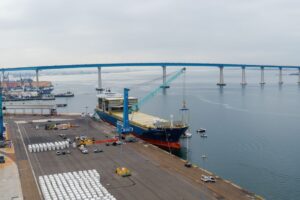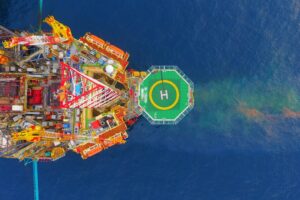Nigeria is one of the largest oil and gas producers in Africa. Consequently, many global energy players have vital operations throughout the country aimed at bringing these essential resources to market. For ExxonMobil, its operations in Nigeria focus on exploring and producing crude oil and natural gas, while manufacturing petroleum products to support the country’s energy sector. Given Nigeria’s reputation for substantial energy production, it is unsurprising that the oil and gas sector contributes significantly to the country’s economic growth. Through a variety of affiliate companies, ExxonMobil has long played a crucial role in Nigeria’s energy sector, delivering energy resources to meet global energy demands in the most responsible manner possible.
Check out the article in the magazine below:
Across Nigeria, ExxonMobil is heavily focused on the upstream aspects of oil and gas production, with its primary focus covering the exploration and production of crude oil and natural gas. Across these operations, the company then covers the transportation and sale of crude oil, natural gas and petroleum products. For this reason, ExxonMobil is a vital manufacturer and marketer of such commodities across Nigeria and the global market. In Nigeria specifically, ExxonMobil has 5 upstream affiliate companies which cover 5 deepwater blocks. These include Esso Exploration and Production Nigeria Limited, Esso Exploration and Production (Offshore East) Limited, Esso Exploration and Production Nigeria (Deepwater West) Limited, Esso Exploration and Production Nigeria (Upstream) Limited and Esso Exploration and Production Nigeria (Deepwater Ventures) Limited. Across these 5 companies, ExxonMobil spans some of the most vital offshore fields surrounding Nigeria to deliver vital oil and gas products to market.
One of the most notable fields for ExxonMobil and Nigeria’s energy development is the Erha Field located off the Nigerian coastline, roughly 85 nautical miles from the Port of Lagos. Within this field, Esso Exploration and Production Nigeria Limited (Esso E&P Nigeria) operate the Erha development inclusive of the Erha terminal. The terminal consists of a spread-moored floating production and offloading (FPSO) unit, which can store 2.2 million barrels of crude oil. The development of the terminal began over 10 years ago in 2003, with production starting in the first quarter of 2006. The terminal remains a key focus for Esso E&P Nigeria today and is now one of the largest FPSO platforms in the world. Today, the Erha Terminal can store 2.2 million barrels of oil (MMbbl), with a capacity to handle 210,000 barrels per day (b/d). In addition to this, the terminal has a capacity of 340 thousand cubic feet per day (Mcf/d) of gas for reinjection, with a 150,000 barrels per day capacity for water reinjection.
Across Erha there are three subsea centres, these are named Erha DCE, DCW and DCN. Both DCE and DCW have a total of 24 wells, of which 15 are producers, whilst 4 are water injection and the remaining 5 are gas injection. DCN has 8 wells, half are used for production and the other half are used for water injection. The development is operated by Esso E&P Nigeria, which holds a 56.25% participating interest in the OML 133 production-sharing contract area where the terminal is located. The remaining 43.7% is owned by Shell Nigeria Exploration and Production Company (Shell Nigeria E&P Co.).
A field that is currently undergoing vital development is the Usan Field located in the OML Block 138. The field, which is operated by TotalEnergies Exploration & Production Nigeria (Total E&P Nigeria), is held jointly between Total E&P Nigeria (20%), Chevron Petroleum Nigeria (30%), Esso Exploration and Production Nigeria (Offshore East) (30%) and China National Offshore Oil (20%). Oil was first discovered in the region in 2002 and was approved for further development in 2008. Just 4 years later, the Usan field began production in 2012, and now the project spans 34 subsea production and injection wells, which are supported by 8 subsea manifolds.
Aside from ExxonMobil’s focus on delivering vital energy resources in Nigeria, the company remains committed to achieving its operations in a sustainable way. ExxonMobil is committed to improving the quality of life and so continues to invest in solutions and initiatives that will support tomorrow whilst delivering the vital energy resources for today. ‘Protect Tomorrow’ is the guiding principle behind ExxonMobil’s sustainability approach, and it is with this in mind that the company is aiming to pursue $30 billion in lower-emission investments between 2025 and 2030. This is a mission that the company is already largely on track with, as it is actively focusing its business plans on reducing its overall emissions.
For ExxonMobil, achieving a more sustainable future is only possible through the implementation of technology and policies which are targeted to help the company achieve net-zero emissions by 2050. With this focus, the company strives for environmental excellence in every aspect of its operations. Beyond its sustainability measures within the company, ExxonMobil is also focused on working with local economies, communities and its workforce to deliver a culture and community that is respected, supported, and safe surrounding its operations.
Whilst ExxonMobil’s operation in Nigeria remains vast, there is a key central focus to deliver the vital infrastructure, investment and development to help the country’s energy sector thrive. With vital operations spanning some of the most lucrative deposits along the West African coastline, ExxonMobil Nigeria is set on delivering vital economic growth to the region supported by its dynamic and reliable energy delivery operations. As the company moves towards the future, it continues to balance the need for energy resources with a focus on reducing emissions on a global scale. Therefore, through vital energy delivery operations, it is set to continue to enhance the country’s energy development and help deliver these resources to key markets across the world.








